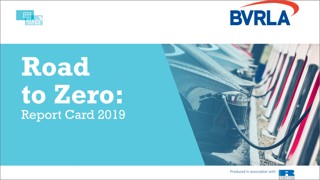Organisations must take short-term action to cut transport emissions instead of waiting for the electric solution to arrive, delegates at the Low Carbon Vehicle Partnership conference will be told today.
The conference - More than electric dreams? Future fuels on the Road to Zero? – will look at if accelerating the drive to battery electric vehicles can deliver road transport’s contribution to ‘net zero’, or whether other measures to cut emissions from liquid fuels and combustion engines should be used while the transition to electric is being made.
LowCVP’s Managing Director Andy Eastlake said: “We’re making great strides towards the electrification of cars, vans and buses operating on certain duty cycles and with specific customers, but with sales still only a few percent of the total volume we must redouble our efforts to accelerate that transition.
“But, in combination with that, we surely need to take as much fossil carbon out of the system as soon as we can.
“Indeed, the ‘quickest wins’ and greatest near-term impacts can be delivered through moves to decarbonise more ‘conventional’ transport fuels used in internal combustion engines (ICEs).”
The Government has announced a target to end the sale of ICE cars and vans by 2040 in its air quality plan.
It its Road to Zero strategy, the Government wants at least 50% - and as many as 70% - of new car registrations to be ultra-low emission by 2030, alongside up to 40% of new vans.
Alongside the conference, LowCVP has published its latest work programme for the next year which aims to enable the largest, most rapid reductions in greenhouse gas emissions from road transport.
LowCVP, which is a collaboration between more than 200 organisations representing government and industry, is an advocate of full lifecycle carbon assessment for vehicles.
It says reducing well-to-wheel greenhouse game impacts through renewable fuels works alongside its commitment to electrification which should drive its mass uptake in cars, vans and heavy vehicles.
LowCVP will also work on projects to stimulate the uptake of high blend renewable fuels and helping further with preparations for the introduction of E10, a 10% ethanol blend in petrol.
Other areas in the partnership’s new work programme include:
- The Electric Vehicle Energy Taskforce (EVET), set up at the request of Government to help ensure the UK’s energy system is ready and able to facilitate the mass take up of EVs.
- Identifying the barriers and opportunities for electrification of depot-based fleets.
- Setting the standards for Ultra Low Emission Trucks to enable the creation of a policy framework to support their accelerated introduction.
- Developing and promoting the rapidly expanding Ultra Low Emission Bus market
- Several work-streams will help ensure there is informed demand for low carbon/emission vehicles, through consumer information, labelling and other mechanisms. There will be a particular focus on supporting the finance and leasing sector in accelerating the ULEV transition.
Eastlake added: “The new ‘net zero’ target means that we must redouble our efforts, working together on the widest range of fronts to deliver our objectives.
“I’ve no doubt that the UK can lead the way in creating a clean transport future, but this is very challenging and we’ll need the most ambitious policies, innovative products and highly motivated people in every area, to make it happen.”






















Login to comment
Comments
No comments have been made yet.